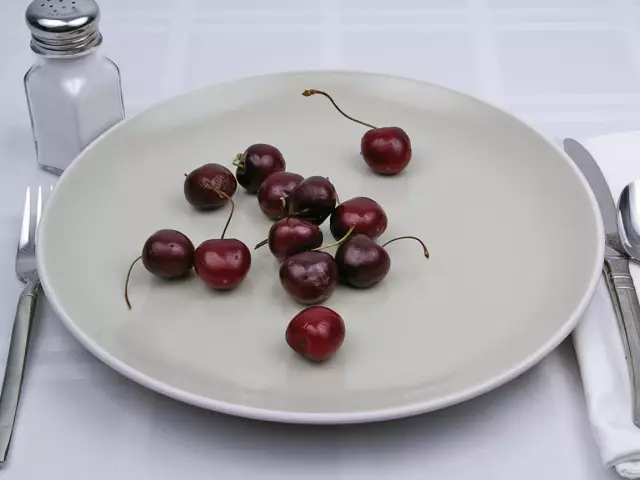- Author Rachel Wainwright wainwright@abchealthonline.com.
- Public 2023-12-15 07:39.
- Last modified 2025-11-02 20:14.
Durian
Durian is a tropical tree belonging to the Malvov family. Its name is translated from Malaysian as "thorn". For more than 6 centuries this plant has been cultivated in the south of Thailand, India, Indochina, Malaysia. It is very rare to find it in Latin and South America. There are more than 30 varieties of durian, but only 9 of them are edible. The taste and smell of durian largely depends on the variety.
The ratio of BJU in the product

Source: depositphotos.com How to burn 147 kcal?
| Walking | 37 minutes |
| Jogging | 16 minutes |
| Swimming | 12 minutes |
| A bike | 21 minutes |
| Aerobics | 29 minutes |
| Household chores | 49 minutes |
Description
Durian is a sprawling evergreen tree reaching a height of 40 meters. Its leaves are arranged alternately and have a pointed shape. The lower part is covered with scales, and the upper part is smooth and shiny. On the hanging branches and trunk, flowers are formed, consisting of three petals and resembling a bell in shape. They can be golden brown, pink, or white. Durian flowers bloom with the onset of dusk, and fall with the first rays of the morning sun.
The fruits ripen in spring. They have a spherical shape (often slightly elongated), reach a mass of 10.0 kg and up to 30.0 cm in diameter. Outside, the fruits are covered with a hard shell, on which numerous pyramidal spines are located. The flesh is quite thick and has a creamy yellow color. Large shiny seeds are located in its thickness. The green durian fruit smells like fresh grass. But the more it ripens, the more its smell changes, becoming sweetish-putrid and very corrosive.
Due to its unpleasant odor, durian is prohibited in many Asian countries from entering public places (hotels, restaurants, shops, transport, etc.).
Legend of the origin of durian
A king lived in Asia many years ago. He was in love with a girl who did not reciprocate. He turned to a local sorcerer for help. And he showed him a tree on which grew fruits with a wonderful aroma and an extraordinary wonderful taste. The sorcerer said that as soon as the girl tasted this fruit, she would immediately fall in love with the king. And so it happened. But the king turned out to be ungrateful and forgot to say "thanks" to the sorcerer. Then he got very angry and cursed the tree that gives the fruits of "love".
After a while, the king again wanted to treat his beloved with a wonderful fruit. He came to a tree and saw on it fetid and thorny fruits. Angrily, he picked one such fruit and threw it on the ground. The fruit split open and the king, unable to resist, tasted its flesh. What was his surprise when he realized that only the smell of durian had changed, but not its magic taste.
How durian fruit is eaten
This tropical plant is often called the "King of Fruits". The durian taste is extraordinarily good. It tastes like vanilla papaya custard.
Fully ripe fruits should be eaten, because unripe tasteless, and overripe taste very bitter. True gourmets consider durian one of the best delicacies. It must be eaten as soon as the fetus is opened. This is the only way you can appreciate the fully saturated taste of durian.
The durian is broken and the flesh is eaten by hand. But it is better to use a spoon, otherwise it will be very difficult to get rid of the unpleasant smell of durian embedded in the skin. Locals drink this fruit with slightly salted water, which is poured into the bowl-shaped halves of the shell. In Thailand, pies stuffed with durian pulp are baked and pickled in coconut milk. In Asia, durian pulp is often added to jams, ice cream and mousses. The taste of durian also goes well with coffee, so it is often served for breakfast.
Unripe fruits are used as vegetables. They are cut into small slices and stewed or fried with the addition of spices. Thais prepare a special paste from durian and pumpkin, which is used as a spice. In Indonesia, it is added to fresh fish soup. The seeds are usually not thrown away, but are well roasted, crushed and used as a spice.
Durian composition
The pulp of this exotic fruit contains 1.47% protein, 5.33% fat, 23.29% carbohydrates, 3.8% dietary fiber and 0% cholesterol. The calorie content of 100.0 g of durian pulp is 147 kcal.
Durian fruits are rich in vitamins. Only 100.0 g of their pulp covers one third of the daily requirement of the human body for ascorbic acid. In addition, they contain carotene, folic acid, niacin, riboflavin, nicotinic acid. They are also a source of minerals - calcium, phosphorus, iron.
Indole, which is part of durian, not only gives it an unpleasant odor, but also useful bactericidal properties.
Durian also contains organic sulfur, which helps to eliminate toxins and toxins from the body. In addition, it is a necessary component of many hormones and proteins, essential for the health of skin, hair, and bone tissue.
Another beneficial property of durian is its high content of fructose and sucrose, which makes this fruit one of the most valuable sources of energy.

Useful properties of durian
Durian is able not only to satisfy the feeling of hunger, but also has healing properties. Its leaves contain mustard oil and hydroxytryptamine, which have antipyretic effects. Local residents use them to treat colds and some infectious diseases. In addition, baths with infusion of durian leaves help in the treatment of jaundice, because promote the excretion of increased bilirubin from the body.
The roots of the plant have an antiviral effect.
The durian fruit is used as a good anthelmintic and the seeds are astringent and are used to treat diarrhea. Amino acids, sulfur and vitamins contained in fruits help to increase general immunity.
But, perhaps, the most important useful property of durian for men is its ability to increase potency.
Contraindications and harm of durian
In no case should Durian be eaten by people suffering from hypertension. It also cannot be combined with any alcoholic beverages, because this can lead to the development of serious poisoning with the most serious consequences, up to and including death.
Durian should not be included in the diet of pregnant women and nursing mothers. And, of course, the use of the fruits of this tropical plant for people suffering from idiosyncrasy (individual intolerance) to it is categorically contraindicated.
YouTube video related to the article:
Found a mistake in the text? Select it and press Ctrl + Enter.






